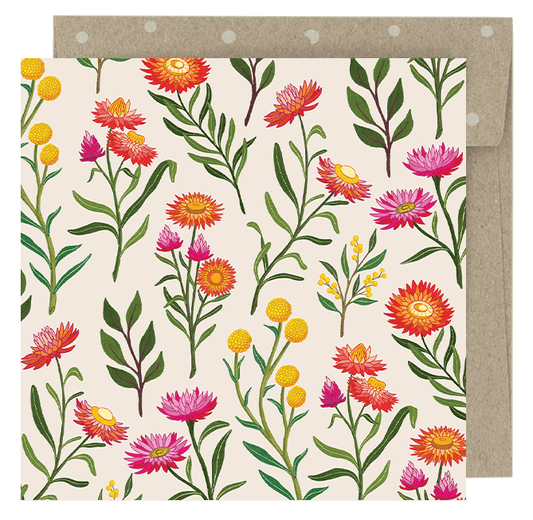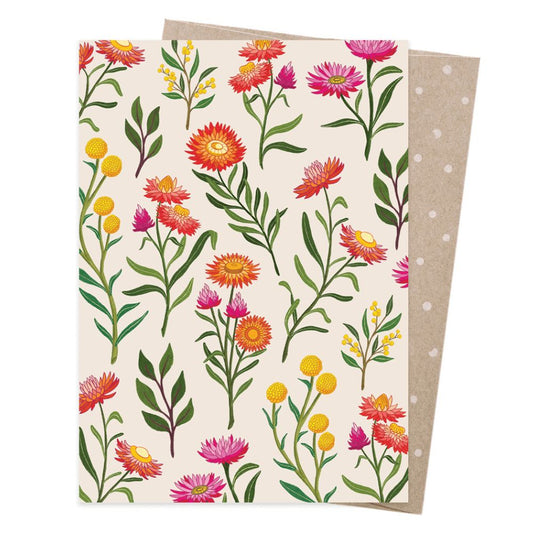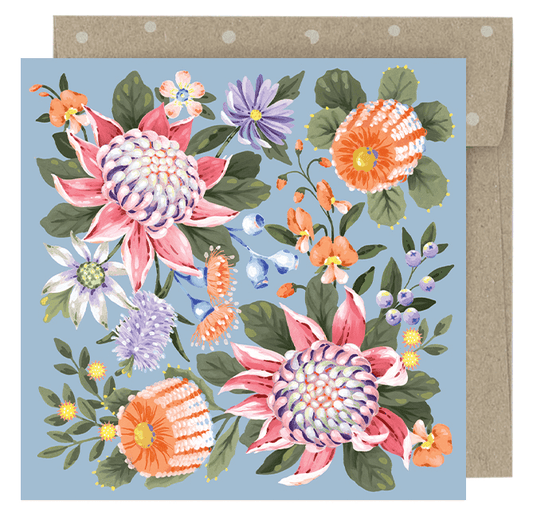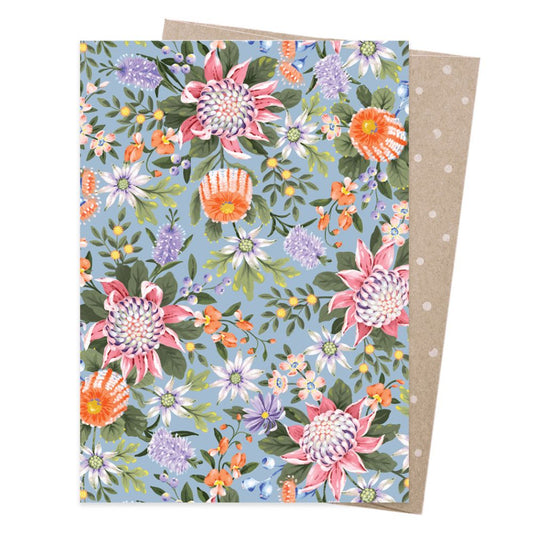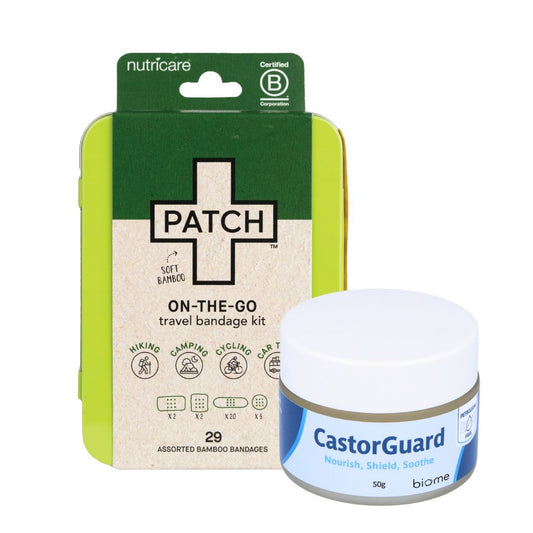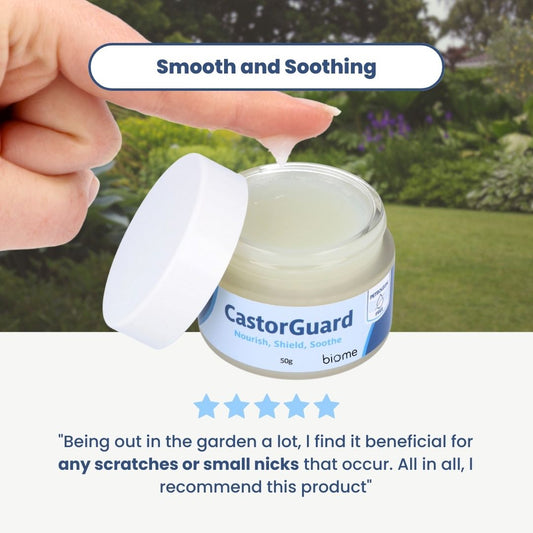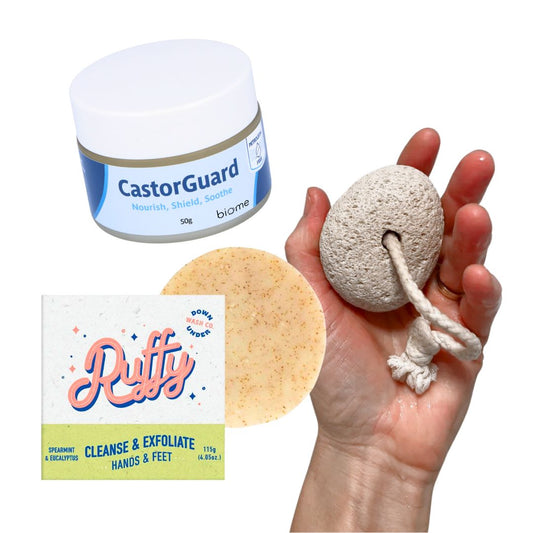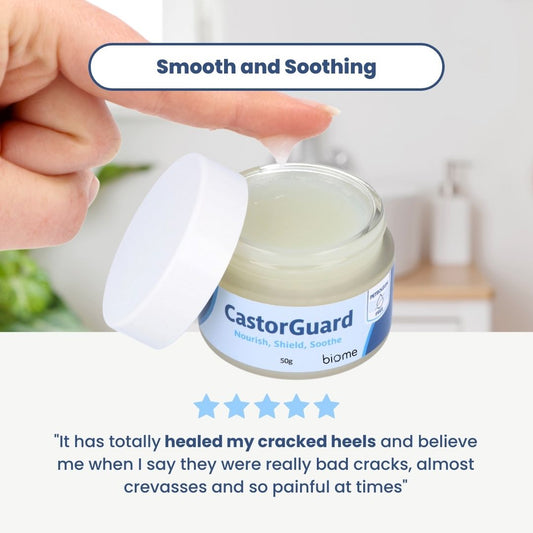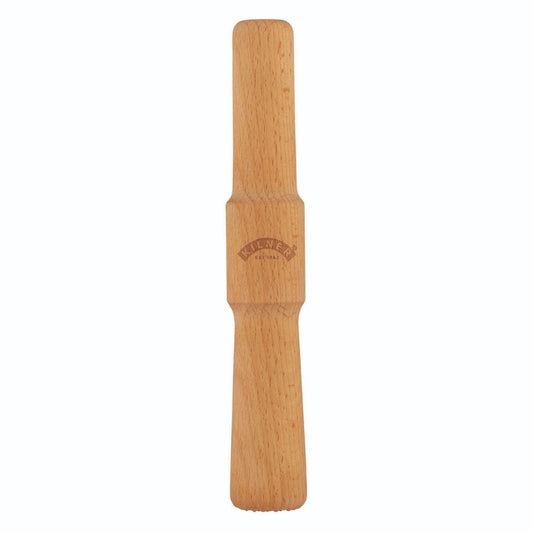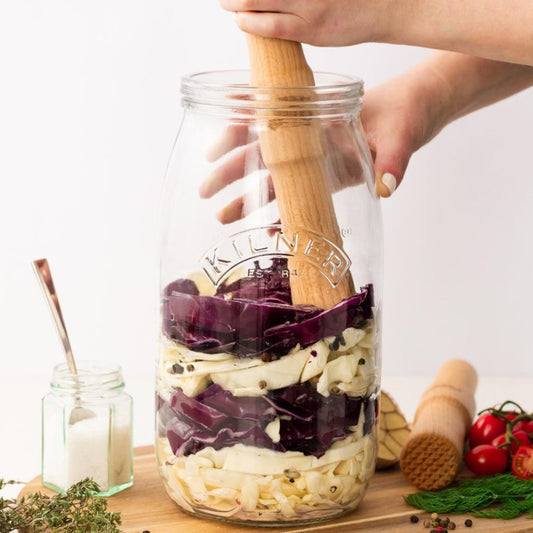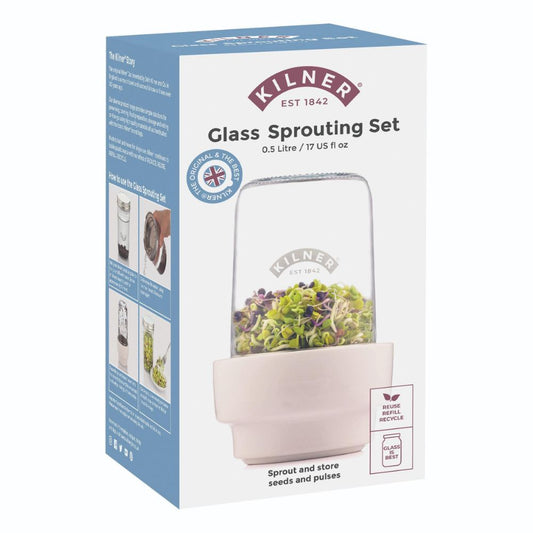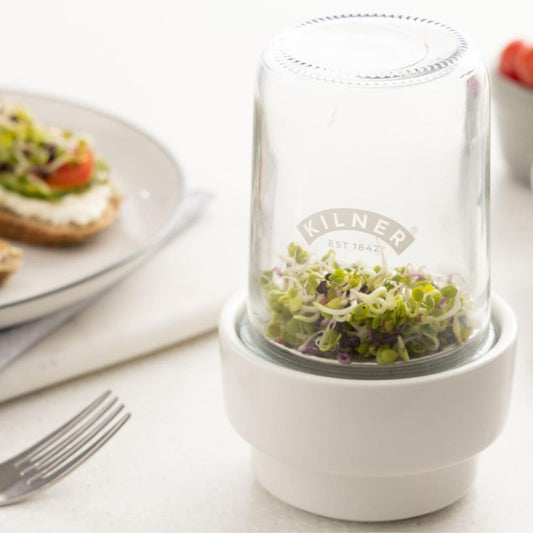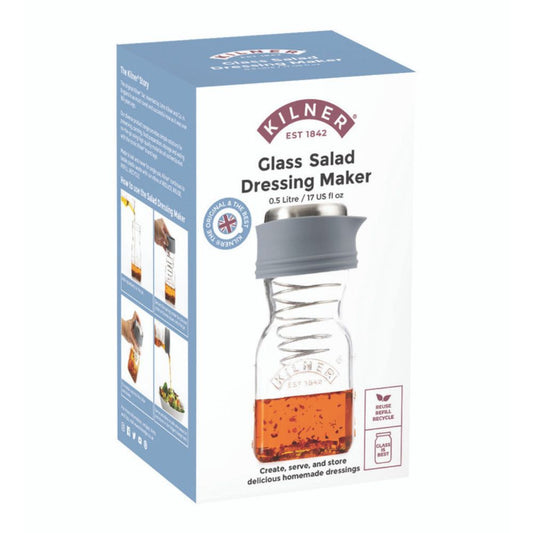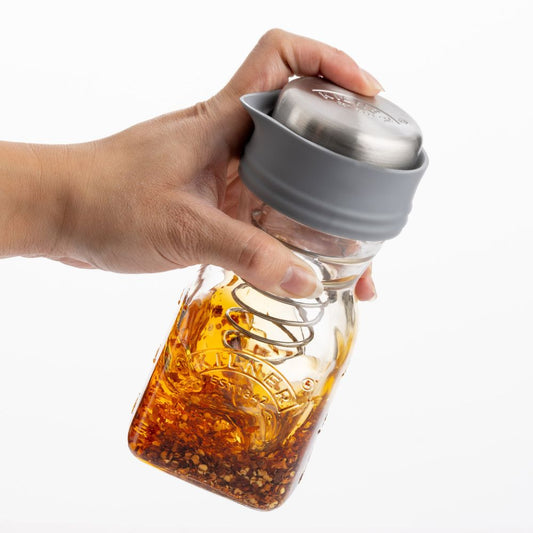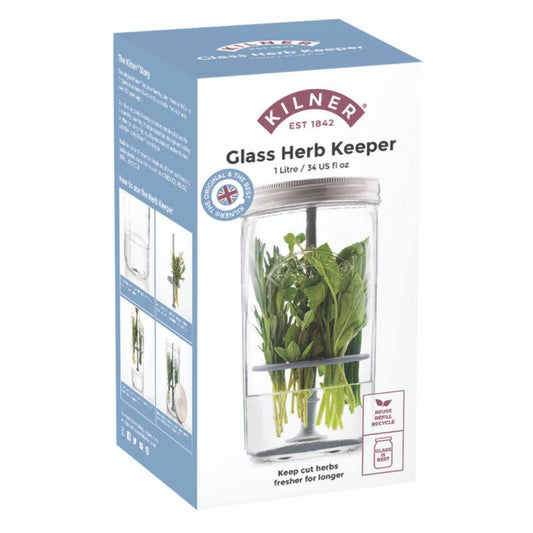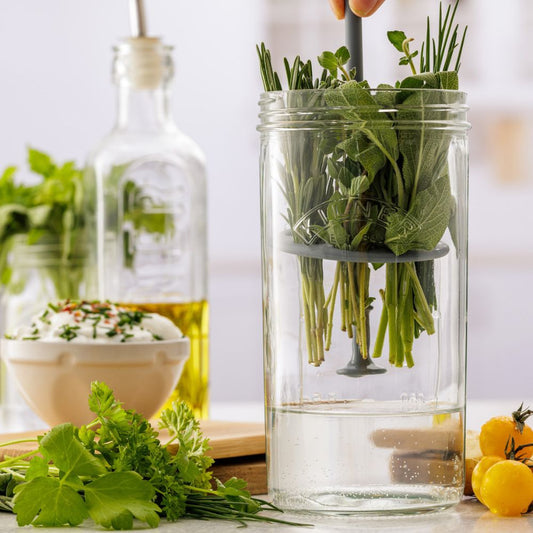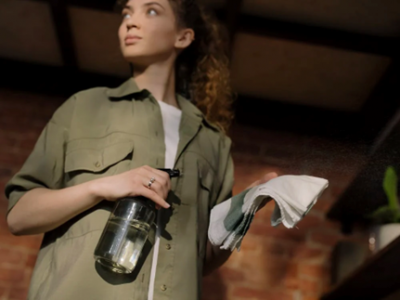
Cleaning your home with simple, natural ingredients is a great way to limit waste, save money, and protect your home and the environment from toxins. While they sound a little too good to be true, chemical-free cleaning products can be whipped up using just a few ingredients you likely already have stored away in your pantry. Whether your floors need a good scrub or you're ridding your windows of pesky fingerprints, these homemade cleaning products offer a solution for every household mess. In this guide, we unpack how to get cleaning with baking soda, vinegar, and a few other essential ingredients. It really is that easy!
Ingredients You'll Need For Homemade Cleaning Products
You've probably noticed that most commercial cleaning products contain long-winded ingredients lists (usually full of words you can't pronounce). While they make cleaning products work well, these chemicals release toxins into the air and waterways, and are very damaging to the health of our planet. Fortunately, there are natural alternative ingredients that will deliver a comprehensive clean
without harming our earth. To create your own homemade cleaning products, you'll need:
- Vinegar
- Bi-carb soda
- Cornflour
- Castile soap
- Lemons
-
Essential oils (eucalyptus, peppermint, lavender and lemon are nice to keep on hand)
Other items you might need
For use and storage, you'll also require:
Natural Cleaning Products
Below, we share a list of natural cleaning products, breaking down the ingredients, how to use them, and what they're best for.
Homemade Antibacterial/Disinfectant Spray: Best for Countertops, Surfaces and General Purpose
This one requires a bit of planning, so schedule your preparation a few weeks before a big house clean. Collect citrus peels (any citrus of your choice) in a large glass jar, and cover with white vinegar. Allow the peels to sit in the vinegar for at least two weeks. Then, strain one up of the vinegar into a reusable spray bottle. Dilute with one cup of water and shake to combine. You can also add some fresh rosemary or thyme to the peel and vinegar mix if you have them on hand. Spray and wipe over counters, surfaces, around the fridge and in cupboards to clean. Avoid use on marble. Store in a cool, dark place, out of direct sunlight.
Vinegar and Water Glass Cleaner: Best for Glass, Windows and Mirrors
Sick the pungent chemical smell of your regular spray and wipe? Us too. This recipe uses essential oils to deliver a light, refreshing scent, while the vinegar and cornflower work to remove grease and grime. In a reusable spray bottle, combine 1/4 cup vinegar, one cup of water, one teaspoon of cornflour and ten drops of peppermint essential oil. Shake to combine. Spray and wipe over glass, windows and mirrors to clean. Store in a cool dark place out of direct sunlight.
Baking Soda and Vinegar Cleaner: Best for Mould

If you've ever experienced issues with mould (haven't we all) you've probably wondered,
does baking soda and vinegar clean mould? Fortunately, it can! This combination is effective for cleaning mould off small, non-porous surfaces. Think glass, baths, tiles, and sinks.
Note: if you have a pre-existing health condition that could be worsened by mould, do not attempt to clean it yourself. Speak to your doctor and contact a mould specialist. First, ensure you're decked out in the appropriate safety equipment. Pop on a mask, gloves, and goggles before cleaning mouldy surfaces. Mix two parts baking soda with one part vinegar and one part water. Then, mix until it creates a thick paste. Spread the paste onto the mouldy surface and let it dry. Once dry, scrub it off and rinse with warm water, then repeat until the mould is removed. It's best to mix up a new batch of these house cleaners each time, so only make up as much as you need for the one cleaning session.
Bi-Carb Soap Scrub: Best for Sinks, Stoves and Grout
For those stubborn areas that need a good scrub, we love this bi-carb soda recipe. Combine 1/2 cup of
bi-carb soda with three teaspoons of
liquid castile soap and ten drops of
eucalyptus essential oil (your house will be left smelling amazing!). Mix well and use the liquid to clean sinks, stainless steel stoves, around taps and anywhere that needs a bit of extra elbow grease. This won't keep, so mix it up when you're preparing for a big clean and use it in the one go.
White Vinegar and Water Cleaning Solution: Best for Tiles and Wooden Floors
There's something very satisfying about freshly cleaned, sparkling floors. Whether you're working with tiles or wooden floorboards, this recipe will work wonders and have your floors looking brand new. Combine one litre of hot water with 1/4 cup of white vinegar and ten drops of
essential oil (we're loving
rose geranium or
lavender). Mop the floors as normal, and watch them shine!
Coconut Oil and Candelilla Wax: Best for Furniture Polish
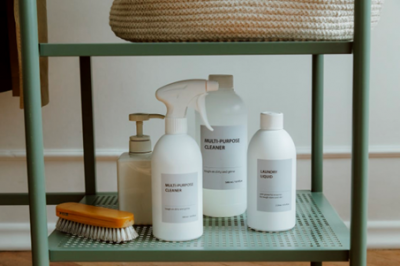
Want to return your wooden furniture to its former glory? We've got the perfect recipe. Place ¼ cup of
candelilla wax, ½ cup of
coconut oil, and one tablespoon of
jojoba oil in a glass jar. Pop the glass jar into a saucepan with about 6cm of water in it. Put the saucepan (with jar inside) on medium heat until the contents of the jar have melted. Remove the jar and stir in 15 drops of your favourite
essential oil. Let the mixture cool, then store it in a container. To use it, scoop out the mixture with your hands or a cloth, and work it into your wooden furniture. Wipe off the excess when finished, and store the mixture in a cool dry place for next time. Head to our dedicated blog for the complete low down on
eco-friendly furniture polish.
Half a Lemon: Best for Dishwashers and Limescale and Calcium Build Up
For dishwashers and shower screens with limescale and calcium build-up, a lemon is a powerful cleaning tool. Yep, you read that right: a lemon. Cut a lemon in half and rub over shower screens or where there is limescale. Leave it on for 30 minutes before washing or wiping off. Place the other half of the lemon in the cutlery compartment of an empty dishwasher. Run the dishwasher and at the end of the cycle, wipe over the inside of the dishwasher and clean out the filters. Your showers and dishwasher will come up sparkling!
Water and Lemon: Best tor the Microwave and Oven
A water and lemon mixture will help to restore those particularly greasy microwave and oven interiors. In a glass jug or bowl, combine one cup of water and the juice of half a lemon. Run the microwave for four minutes, then wait one minute before opening the door. Remove the jug and wipe over the inside of the microwave with a cloth. As for the oven, fill a large ovenproof dish with water and add a lemon that has been cut in half. ‘Bake' for 30 to 45 minutes at 200 degrees celsius. Ensure the oven cools before opening the door. Once cool, wipe over the inside of the oven with a cloth. If you're someone that's has a jam packed schedule, then using a
house cleaning service is going to streamline your day to day. But it's important to use a service that utilises natural products that aren't polluting or creating negative environmental repercussions.
Give Our Homemade Cleaning Products a Go
These DIY cleaning product recipes will leave your home sparkling and smelling amazing, and you won't have to worry about chemicals floating ominously in the air. Ready to get scrubbing? Let us know how you go with these recipes!
We'd love to hear from you. If you're loving all things DIY, explore our range of
cleaning, skincare, and haircare recipes.
 Cleaning your home with simple, natural ingredients is a great way to limit waste, save money, and protect your home and the environment from toxins. While they sound a little too good to be true, chemical-free cleaning products can be whipped up using just a few ingredients you likely already have stored away in your pantry. Whether your floors need a good scrub or you're ridding your windows of pesky fingerprints, these homemade cleaning products offer a solution for every household mess. In this guide, we unpack how to get cleaning with baking soda, vinegar, and a few other essential ingredients. It really is that easy!
Cleaning your home with simple, natural ingredients is a great way to limit waste, save money, and protect your home and the environment from toxins. While they sound a little too good to be true, chemical-free cleaning products can be whipped up using just a few ingredients you likely already have stored away in your pantry. Whether your floors need a good scrub or you're ridding your windows of pesky fingerprints, these homemade cleaning products offer a solution for every household mess. In this guide, we unpack how to get cleaning with baking soda, vinegar, and a few other essential ingredients. It really is that easy!
 If you've ever experienced issues with mould (haven't we all) you've probably wondered, does baking soda and vinegar clean mould? Fortunately, it can! This combination is effective for cleaning mould off small, non-porous surfaces. Think glass, baths, tiles, and sinks. Note: if you have a pre-existing health condition that could be worsened by mould, do not attempt to clean it yourself. Speak to your doctor and contact a mould specialist. First, ensure you're decked out in the appropriate safety equipment. Pop on a mask, gloves, and goggles before cleaning mouldy surfaces. Mix two parts baking soda with one part vinegar and one part water. Then, mix until it creates a thick paste. Spread the paste onto the mouldy surface and let it dry. Once dry, scrub it off and rinse with warm water, then repeat until the mould is removed. It's best to mix up a new batch of these house cleaners each time, so only make up as much as you need for the one cleaning session.
If you've ever experienced issues with mould (haven't we all) you've probably wondered, does baking soda and vinegar clean mould? Fortunately, it can! This combination is effective for cleaning mould off small, non-porous surfaces. Think glass, baths, tiles, and sinks. Note: if you have a pre-existing health condition that could be worsened by mould, do not attempt to clean it yourself. Speak to your doctor and contact a mould specialist. First, ensure you're decked out in the appropriate safety equipment. Pop on a mask, gloves, and goggles before cleaning mouldy surfaces. Mix two parts baking soda with one part vinegar and one part water. Then, mix until it creates a thick paste. Spread the paste onto the mouldy surface and let it dry. Once dry, scrub it off and rinse with warm water, then repeat until the mould is removed. It's best to mix up a new batch of these house cleaners each time, so only make up as much as you need for the one cleaning session.
 Want to return your wooden furniture to its former glory? We've got the perfect recipe. Place ¼ cup of candelilla wax, ½ cup of coconut oil, and one tablespoon of jojoba oil in a glass jar. Pop the glass jar into a saucepan with about 6cm of water in it. Put the saucepan (with jar inside) on medium heat until the contents of the jar have melted. Remove the jar and stir in 15 drops of your favourite essential oil. Let the mixture cool, then store it in a container. To use it, scoop out the mixture with your hands or a cloth, and work it into your wooden furniture. Wipe off the excess when finished, and store the mixture in a cool dry place for next time. Head to our dedicated blog for the complete low down on eco-friendly furniture polish.
Want to return your wooden furniture to its former glory? We've got the perfect recipe. Place ¼ cup of candelilla wax, ½ cup of coconut oil, and one tablespoon of jojoba oil in a glass jar. Pop the glass jar into a saucepan with about 6cm of water in it. Put the saucepan (with jar inside) on medium heat until the contents of the jar have melted. Remove the jar and stir in 15 drops of your favourite essential oil. Let the mixture cool, then store it in a container. To use it, scoop out the mixture with your hands or a cloth, and work it into your wooden furniture. Wipe off the excess when finished, and store the mixture in a cool dry place for next time. Head to our dedicated blog for the complete low down on eco-friendly furniture polish.

